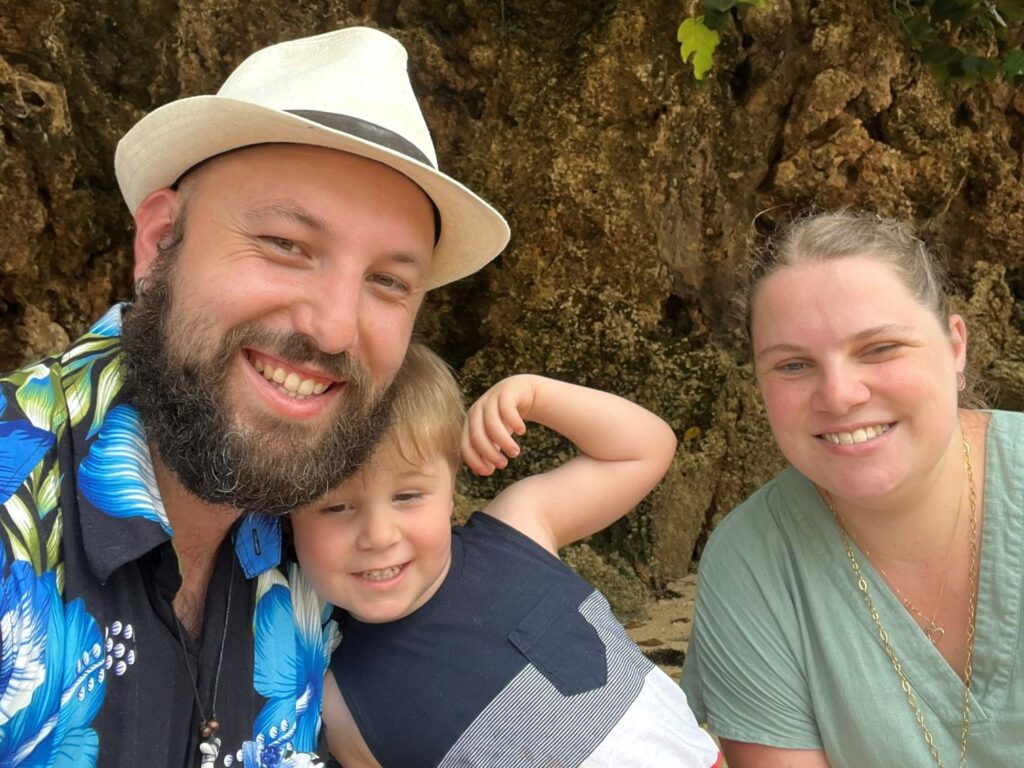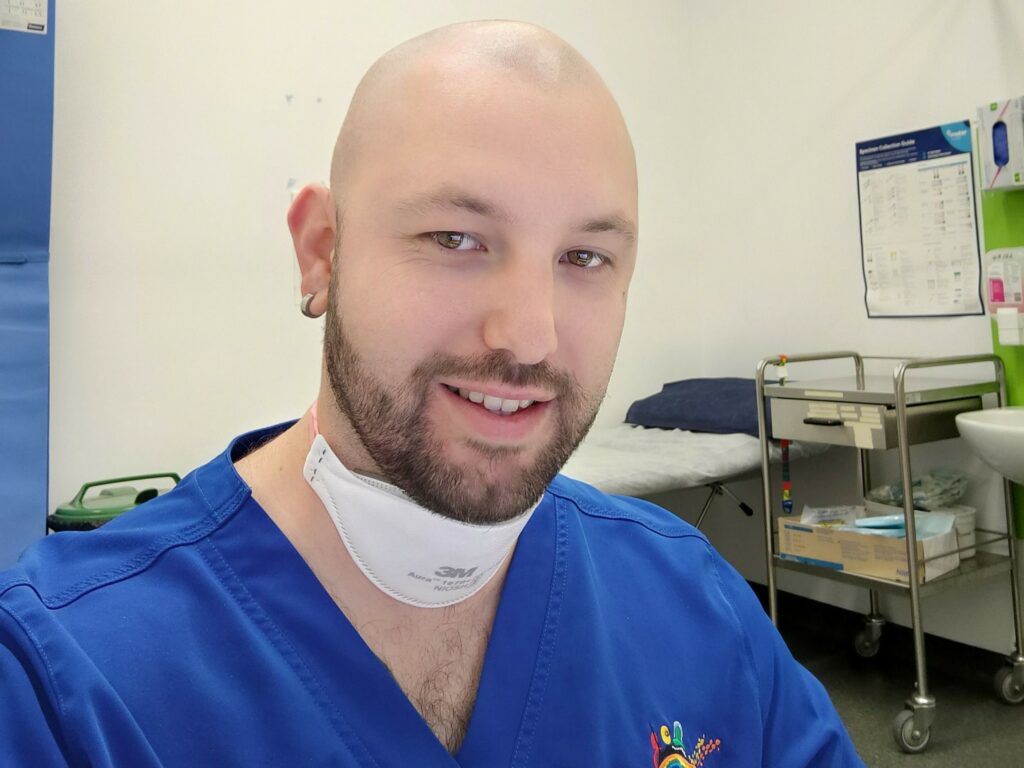Already a member? Click here to login.

Australian Diabetes Educators Association
Already a member? Click here to login.

Already a member? Click here to login.
With the theme of 2023 National Reconciliation Week being Be a Voice for Generations to encourage ‘all Australians to be a voice for reconciliation in tangible ways in our everyday lives’, ADEA’s Aboriginal and Torres Strait Islander Project Leader and proud Wiradjuri man Reece Flynn-O’Brien speaks about using his voice to make Australia a better place.
Reece was born in Belmont in NSW before moving to Queensland when he was two years old. He is now living in the Gubbi Gubbi tribe region, around Deception Bay, Kippa-Ring, and Redcliffe.
He has been at ADEA for about 10 months and recently took up a new nursing role alongside his ADEA position.

ADEA’s First Nations project leader Reece Flynn-O’Brien with his son, Kyran, and wife, Steph. Photo: Supplied
My role at ADEA is the Aboriginal and Torres Strait Islander Project Leader.
The responsibilities of this role involve managing First Nations projects.
I provide advice about areas involving First Nations people and lead and manage projects that mostly involve First Nations people. I also help with other projects at ADEA.
The key projects I am running now are the Aboriginal and Torres Strait Islander Health Worker/Practitioner Mentoring Program, ADEA First Nations NAIDOC Resources, and Indigenous Members Support Program.
I also help with the micro-credentialling program.
The most satisfying aspect of this role is knowing that everything I do is related to providing a pathway into a career in diabetes for the next generation of First Nation health workers, nurses, and those alike.
I was a nurse before coming to ADEA and I worked at an Aboriginal Medical Service where I noticed about one-third of our clients who came through the clinic had diabetes.
Of those who had diabetes, about half had uncontrolled diabetes.
This sparked the motivation to complete my diabetes education certificate so I can become a Diabetes Educator.
The new nursing role is in a diabetes service at the Ipswich Health Plaza under West Moreton Health.
This role is to help me gain clinical experience in this field so I can become a Credentialled Diabetes Educator (CDE) and work as such within the community or hospital service. It also helps our community self-manage their diabetes and live a healthier and happier life.

Nurse Reece Flynn-O’Brien. Photo: Supplied
Reconciliation week for me means that we as nation come together to learn from our past and our history to reconcile now and in the future for a more equitable, just, and safe nation.
Be a Voice for Generations means that we as the current leaders in our fields of work and community standing up, becoming role models, and voicing what we believe should help pave the way for the next generation to help them become leaders.
It would also show them the way to be voices within their communities and work areas to help create a better tomorrow.
I believe as nation, we need to calm down and stop pointing fingers and blaming one another regarding issues of the nation. We need to come together to brainstorm ideas to make Australia better and work together on it—this should help allow everyone in the country to live better and easier.
For example, the living crisis now where rent, food, petrol, and the cost of living in general is skyrocketing making it more difficult for everyone to live.
If we can come together properly and work together as a nation, I’m sure we can create a better and more united Australia where we can reduce the cost of living and live more comfortably.
My idols are the people of the country who are classified as low economic status (of which I would be classified) who struggle every day to make ends meet and live the lives they do.
The people who can support their families survive and live a somewhat healthy life despite the increase in living costs and having minimal incomes that haven’t increased in years.
In conclusion, if we as a nation can learn from our past and come together like we say we do, we can create a better future for all and help pave the way to greatness for the next generation.
ADEA is committed to strengthening relationships between Aboriginal and Torres Strait Islander peoples and non-Indigenous peoples in the education, care, and management of diabetes. This commitment includes increasing the number of First Nations CDEs in Australia, through our scholarship program and our Aboriginal and/or Torres Strait Islander Credentialling Pathway. Additionally, ADEA continues to advocate for funding additional CDE visits across Australia, particularly in rural and remote First Nations communities, and for policies that promote closing the gap in diabetes health. During the launch of ADEA’s Reconciliation Action Plan, CEO Susan Davidson said the plan ‘is the culmination of years working to foster reconciliation with Aboriginal and Torres Strait Islander peoples and the broader Australian community’. As an organisation, we have a deep commitment to the work of fostering reconciliation between Australia’s First Peoples and the broader community and are committed to continuing our reconciliation journey.
With the theme of 2023 National Reconciliation Week being Be a Voice for Generations to encourage ‘all Australians to be a voice for reconciliation in tangible ways in our everyday lives’, ADEA’s Aboriginal and Torres Strait Islander Project Leader and proud Wiradjuri man Reece Flynn-O’Brien speaks about using his voice to make Australia a better place.
Reece was born in Belmont in NSW before moving to Queensland when he was two years old. He is now living in the Gubbi Gubbi tribe region, around Deception Bay, Kippa-Ring, and Redcliffe.
He has been at ADEA for about 10 months and recently took up a new nursing role alongside his ADEA position.

ADEA’s First Nations project leader Reece Flynn-O’Brien with his son, Kyran, and wife, Steph. Photo: Supplied
My role at ADEA is the Aboriginal and Torres Strait Islander Project Leader.
The responsibilities of this role involve managing First Nations projects.
I provide advice about areas involving First Nations people and lead and manage projects that mostly involve First Nations people. I also help with other projects at ADEA.
The key projects I am running now are the Aboriginal and Torres Strait Islander Health Worker/Practitioner Mentoring Program, ADEA First Nations NAIDOC Resources, and Indigenous Members Support Program.
I also help with the micro-credentialling program.
The most satisfying aspect of this role is knowing that everything I do is related to providing a pathway into a career in diabetes for the next generation of First Nation health workers, nurses, and those alike.
I was a nurse before coming to ADEA and I worked at an Aboriginal Medical Service where I noticed about one-third of our clients who came through the clinic had diabetes.
Of those who had diabetes, about half had uncontrolled diabetes.
This sparked the motivation to complete my diabetes education certificate so I can become a Diabetes Educator.
The new nursing role is in a diabetes service at the Ipswich Health Plaza under West Moreton Health.
This role is to help me gain clinical experience in this field so I can become a Credentialled Diabetes Educator (CDE) and work as such within the community or hospital service. It also helps our community self-manage their diabetes and live a healthier and happier life.

Nurse Reece Flynn-O’Brien. Photo: Supplied
Reconciliation week for me means that we as nation come together to learn from our past and our history to reconcile now and in the future for a more equitable, just, and safe nation.
Be a Voice for Generations means that we as the current leaders in our fields of work and community standing up, becoming role models, and voicing what we believe should help pave the way for the next generation to help them become leaders.
It would also show them the way to be voices within their communities and work areas to help create a better tomorrow.
I believe as nation, we need to calm down and stop pointing fingers and blaming one another regarding issues of the nation. We need to come together to brainstorm ideas to make Australia better and work together on it—this should help allow everyone in the country to live better and easier.
For example, the living crisis now where rent, food, petrol, and the cost of living in general is skyrocketing making it more difficult for everyone to live.
If we can come together properly and work together as a nation, I’m sure we can create a better and more united Australia where we can reduce the cost of living and live more comfortably.
My idols are the people of the country who are classified as low economic status (of which I would be classified) who struggle every day to make ends meet and live the lives they do.
The people who can support their families survive and live a somewhat healthy life despite the increase in living costs and having minimal incomes that haven’t increased in years.
In conclusion, if we as a nation can learn from our past and come together like we say we do, we can create a better future for all and help pave the way to greatness for the next generation.
ADEA is committed to strengthening relationships between Aboriginal and Torres Strait Islander peoples and non-Indigenous peoples in the education, care, and management of diabetes. This commitment includes increasing the number of First Nations CDEs in Australia, through our scholarship program and our Aboriginal and/or Torres Strait Islander Credentialling Pathway. Additionally, ADEA continues to advocate for funding additional CDE visits across Australia, particularly in rural and remote First Nations communities, and for policies that promote closing the gap in diabetes health. During the launch of ADEA’s Reconciliation Action Plan, CEO Susan Davidson said the plan ‘is the culmination of years working to foster reconciliation with Aboriginal and Torres Strait Islander peoples and the broader Australian community’. As an organisation, we have a deep commitment to the work of fostering reconciliation between Australia’s First Peoples and the broader community and are committed to continuing our reconciliation journey.